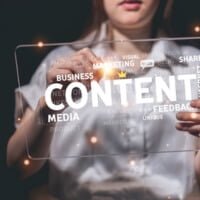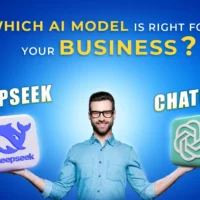Artificial intelligence (AI) is revolutionizing how marketers approach social media content and campaigns. With AI now deeply embedded in key social media platforms, businesses can enhance features and streamline activities on a grand scale. According to The 2024 State of Social Media Report, a remarkable 97% of business leaders agree that AI significantly optimizes social media data and insights, boosting marketing efforts.
What is AI in Social Media?
AI in social media marketing leverages advanced technologies such as machine learning and natural language processing to examine user data and interactions across social platforms. This allows marketers to use AI tools for content creation, social media listening, brand awareness, ad targeting, and influencer research. These capabilities enable data-driven decision-making to shape a more effective social media strategy.
Ultimately, the goal is to ensure that social media feeds are filled with content that is both relevant and engaging for users, including advertisements. AI achieves this through hyper-personalization.
Examples of How to Use AI in Social Media
The potential of AI in social media is vast. Here are some key areas where AI can significantly enhance marketing tasks:
1. Content Generation
AI tools are transforming the landscape of content creation. While ChatGPT is widely known, other tools like Claude and Jasper are also making significant strides. These tools assist marketers in generating content based on factors such as keywords, target audience, digital channels, tone, and brand voice. This can include social posts, articles, scripts, videos, and images, saving valuable time and resources for companies.
2. Influencer Marketing
AI can identify influencers who resonate with your target audience and weed out fraudulent ones. These tools evaluate an influencer’s engagement level, content style, and performance, helping to assess ROI. For example, luxury brand Balmain took influencer marketing to the next level by using virtual models like Shudu, the world’s first virtual supermodel, in their campaigns.
3. Personalization
AI analyzes user behavior and preferences, allowing marketers to deliver tailored content that truly resonates. TikTok’s algorithm is a prime example, effectively recommending content and even serving as a search engine for many users. AI can also optimize posting times, analyze KPIs in real-time, and utilize social listening to identify relevant topics and trends.
4. Customer Service
Social media has become a key customer service channel, and AI-powered chatbots and virtual assistants on platforms like Facebook Messenger and WhatsApp provide quick and efficient responses. For instance, Coca-Cola’s chatbot on Instagram connects users to local restaurants for the “perfect meal,” enhancing the customer experience.
5. Advertising
AI tools can analyze targeting and budget variations, segment audiences, manage ad campaigns, generate and optimize ad content, conduct A/B testing, and provide predictive analytics. Lingerie retailer Cosabella, for example, used an AI platform named Albert to increase its social media return-on-ad-spend by 336% and boost social sales by 20x.
What are the Best AI Social Media Tools?
Managing social media for a business can be time-consuming, especially across multiple networks. AI tools can streamline processes, enhance strategies, and improve customer engagement. Here are some of the most effective AI tools for social media:
- ChatGPT: Generates human-like text responses across various topics.
- Midjourney and DALL-E: Create AI images from prompts.
- Brandwatch: Monitors and analyzes social media and web conversations.
- Sprout Social: Schedules posts, engages with audiences, and analyzes metrics.
- AdEspresso: Optimizes and manages social media ad campaigns.
- Chatfuel: Deploys chatbots on messaging platforms.
- Upfluence: Identifies and analyzes influencers.
- CapCut: An AI-powered online video editor.
- Grammarly: Improves written content’s grammar, punctuation, style, and tone.
- Canva: Creates unique images, art, and videos.
- Whimsical Diagrams: Visualizes social media planning.
- Ubersuggest Chrome Plugin: Provides search volume and CPC data.
- Answer The Public: Offers insights into popular search queries.
- ManyChat: Automates interactions on Instagram, Facebook Messenger, and WhatsApp.
4 Examples of Brands Using AI in Social Media
Here are some real-world examples of brands effectively using AI in their social media strategies:
1. Heinz A.I. Ketchup
Heinz used AI-powered DALL-E 2 to generate images of ketchup by giving prompts like “ketchup scuba diving.” The campaign resulted in user-generated suggestions and images, creating the first ad campaign with visuals entirely generated by AI.
2. Ryan Reynolds & Mint Mobile
Ryan Reynolds, known for his witty humor, used ChatGPT to generate a commercial script for Mint Mobile. By providing specific prompts, he created an engaging commercial that resonated with audiences, showcasing AI’s potential in content creation.
3. Sephora & Ora
Sephora launched a chatbot named Ora on Facebook and Messenger to assist customers with frequent queries and provide personalized content. The chatbot enhances the customer experience by offering beauty tips and tracking orders.
4. Ray-Ban & Meta
Ray-Ban developed smart glasses with Meta’s AI virtual assistant technology, enabling users to access real-time information through the glasses. This innovation shows how AI can enhance product functionality and user experience.
The Pros and Cons of AI in Digital Marketing
While AI offers many benefits, it also comes with potential drawbacks. Here are some pros and cons to consider:
Pros:
- Efficiency: Automates time-consuming tasks, freeing up resources.
- Personalization: Delivers tailored content to improve user engagement.
- Data Insights: Provides valuable data-driven insights for better decision-making.
- Scalability: Helps manage large-scale social media operations.
Cons:
- Cost: Initial investment in AI tools can be high.
- Complexity: Requires technical knowledge to implement and manage.
- Dependence: Over-reliance on AI can lead to a lack of human touch.
- Ethical Concerns: Issues such as data privacy and AI biases need to be addressed.
Conclusion: Social Media & AI
AI is undeniably transforming digital marketing. With the AI market in social media expected to reach $3.7 million by 2026, integrating AI into social media strategies is becoming crucial for gaining a competitive edge. By experimenting with AI tools and platforms, marketers can enhance their social media efforts, generate optimized content, conduct social listening, and automate advertising.
Optimize and scale your social media marketing with AI, and see how it can help you deliver the right content to the right audience at the right time. Explore our AI in Digital Marketing course to learn the fundamentals of AI, implement data-driven marketing, and understand key AI tools and ethics. Get started today!
















